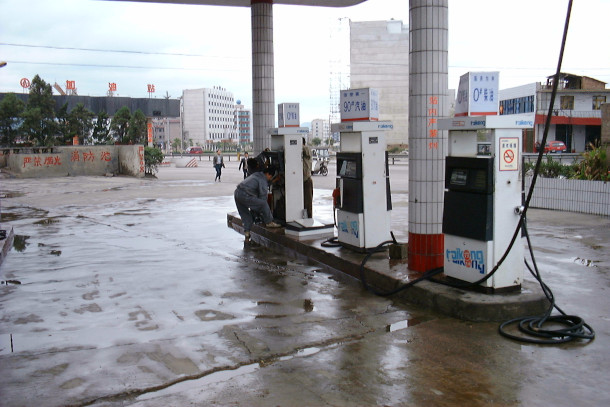From the History Books
Air Date: Week of June 28, 2024

The sale of leaded gasoline in China was banned in July 2000. (Photo: LHOON, Flickr, CC BY-SA 2.0)
This week, Living on Earth Contributor Peter Dykstra and Host Aynsley O’Neill look back to the year 2000, when China finally banned the use of lead in gasoline. The same year, a historic rescue moved some 18,000 African or “jackass” penguins out of the path of an oil spill.
Transcript
O'NEILL: On the line with me now from Atlanta, Georgia is Peter Dykstra. He's gonna take a look through the history books for us today. Hey, Peter, what do you have?
DYKSTRA: Hi Aynsley, the first piece is from good news from a very big and important place. It goes back almost a quarter of a century. On July 1, 2000, China banned the manufacture and use of leaded gasoline. Evidence from around the world showed the linking of burning of leaded gasoline caused brain damage and declining IQ levels, particularly in children. Childhood lead pollution is still a problem in China. So it's hard to gauge exactly how much this leaded fuel ban has helped, because there are so many other industrial sites in China that still use lead. But either way, it's good news that they've been off leaded gasoline for 24 years.
O'NEILL: And in the US, I think we started a ban on leaded gasoline in the 70s or so right, Peter?
DYKSTRA: Yes, we did. But there are still some uses here and there for leaded gasoline in the United States, still perfectly legal. One is general aviation, small propeller-driven planes can use leaded fuel, and some lawn equipment can also use leaded fuel, but for the most part, it's been gone. And the beneficial health impacts show very strongly here.
O'NEILL: Yeah, it's a boon for you know, a young person's health and development. And Peter, what else do you have for us this week?
DYKSTRA: Also, from the year 2000, how can you not love a species called the Jackass penguin? There were 18,000 Jackass penguins that were in danger from an oil slick along with other wildlife that were airlifted out of the path of a slick from a sunken Panamanian tanker. This near the South African city of Cape Town. The South African National Foundation for the Conservation of Coastal Birds organized the rescue and it successfully moved Jackass penguins also known by the somewhat more polite name of African penguins out of harm's way from the slick.
O'NEILL: I love those penguins, Peter. I get to see them all the time at the New England Aquarium, but never 18,000 at once. That's quite the rescue.
DYKSTRA: That'd be a problem for an aquarium. But one other thing that one of the sites of this rescue is famous for: Robben Island right near Cape Town took the brunt of some of the spill. If you've heard of Robben Island before,it's probably because it's also home to the infamous prison where Nelson Mandela was held for so many years.
O'NEILL: Peter, I've got to hand it to you, only you can somehow get a fact about a Jackass penguin and a fact about Nelson Mandela into the same sentence.
DYKSTRA: And only on Living on Earth.
O'NEILL: Alright, thank you, Peter. I appreciate you bringing these stories from the history books, and we will talk to you again soon. Peter Dykstra is a contributor to Living on Earth.
DYKSTRA: Thanks, Aynsley, we'll talk to you soon.
O'NEILL: And there's more on these stories at the Living On Earth website, loe.org.
Links
Living on Earth wants to hear from you!
Living on Earth
62 Calef Highway, Suite 212
Lee, NH 03861
Telephone: 617-287-4121
E-mail: comments@loe.org
Newsletter [Click here]
Donate to Living on Earth!
Living on Earth is an independent media program and relies entirely on contributions from listeners and institutions supporting public service. Please donate now to preserve an independent environmental voice.
NewsletterLiving on Earth offers a weekly delivery of the show's rundown to your mailbox. Sign up for our newsletter today!
 Sailors For The Sea: Be the change you want to sea.
Sailors For The Sea: Be the change you want to sea.
 The Grantham Foundation for the Protection of the Environment: Committed to protecting and improving the health of the global environment.
The Grantham Foundation for the Protection of the Environment: Committed to protecting and improving the health of the global environment.
 Contribute to Living on Earth and receive, as our gift to you, an archival print of one of Mark Seth Lender's extraordinary wildlife photographs. Follow the link to see Mark's current collection of photographs.
Contribute to Living on Earth and receive, as our gift to you, an archival print of one of Mark Seth Lender's extraordinary wildlife photographs. Follow the link to see Mark's current collection of photographs.
 Buy a signed copy of Mark Seth Lender's book Smeagull the Seagull & support Living on Earth
Buy a signed copy of Mark Seth Lender's book Smeagull the Seagull & support Living on Earth

